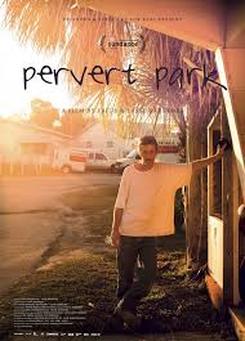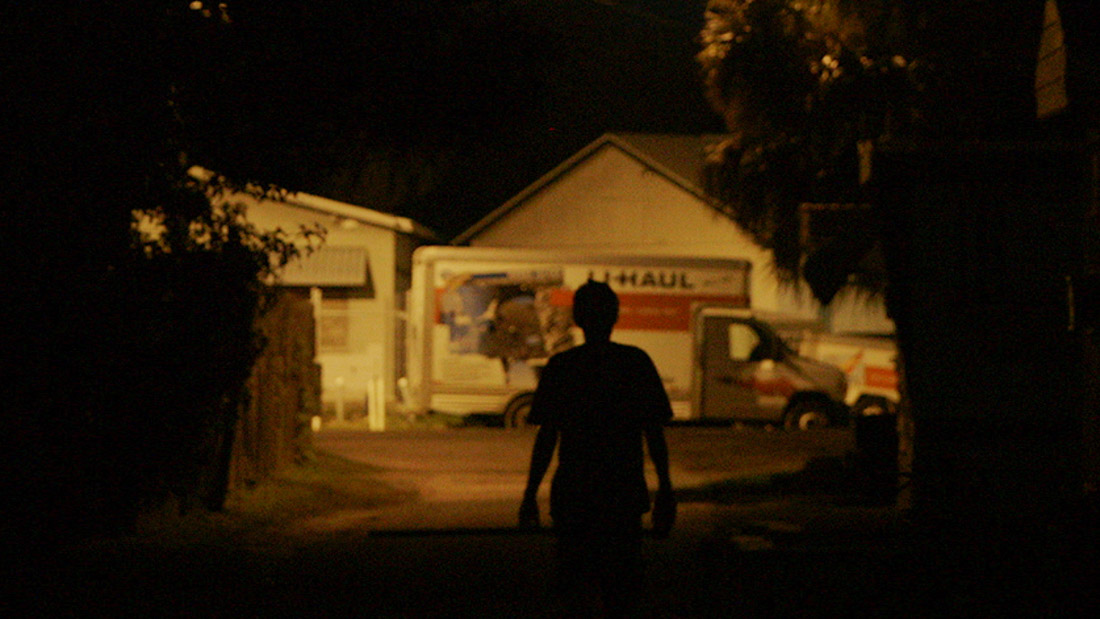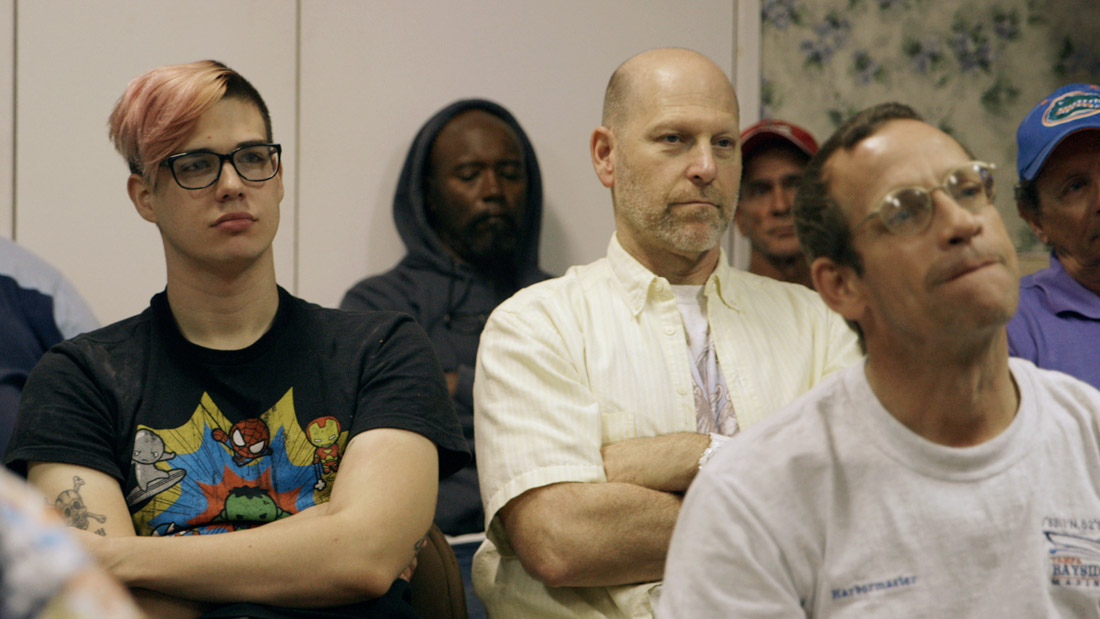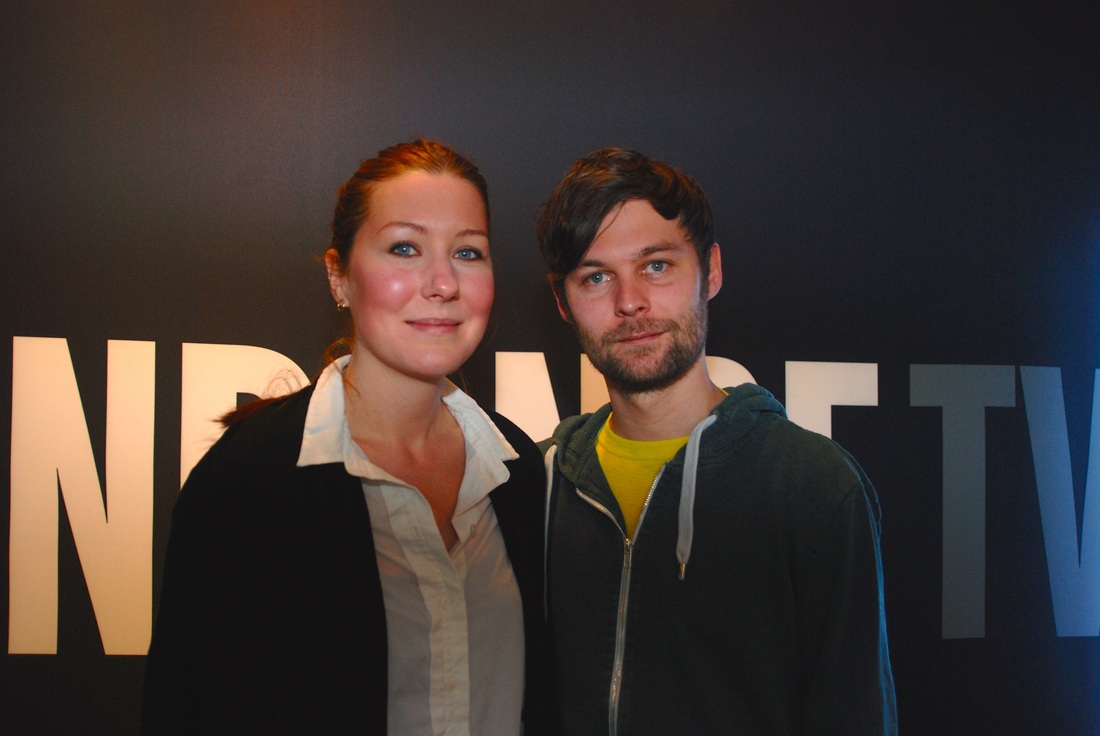|
PBS to air film some thought would never reach a wider American audience, including co-directors
Note: This article is a re-formatted and updated version of the first post to appear on Nonfictionfilm.com, in January 2015
In America, sex offenders are considered about the lowest of the low, beyond redemption or rehabilitation.
There's even a TV series focused on their crimes that begins with the voiceover, "In the criminal justice system, sexually based offenses are considered especially heinous." Florida and other states tightly restrict where registered sex offenders can live, which in practice serves as a form of banishment. The new documentary Pervert Park dares to take a closer look at registered sex offenders and to question whether ostracizing them is really in the best interests of society. They were skeptical toward us until they realized we didn't have a hidden agenda. Then they were very open.
The film, which earned the "Documentary Special Jury Award: for Impact" at Sundance in 2015, was directed by Frida and Lasse Barkfors, a couple from (respectively) Sweden and Denmark.
It debuts Monday [July 11] on PBS stations, a 60-minute version cut down from the original 117 minutes.
The Barkfors spent portions of several years observing life in the Palace Mobile Home Park in St. Petersburg, Florida that is home to more than one hundred registered sex offenders. "Pervert Park" is the derisive sobriquet applied to the residential community by wary locals.
"These are the people no one wants to live amongst," the Barkfors said in a directors' statement. "These are the neighbors we wish away and, through sex offender laws/labeling literally move to the outskirts of our towns and our lives... Although many of their crimes are unspeakable, what do we as a community gain from our willful silence? If we hope to curb the cycle and culture of sexual violence, is there value in exploring the lives of sex offenders, regardless of how heartbreaking and difficult it might be?" Nonfictionfilm.com spoke with the Barkfors at Sundance in 2015. NFF: How did two filmmakers from Scandinavia find out about this obscure trailer park in Florida and then decide to make a movie about it? Frida Barkfors: A journalist (did) the pre-work for us. He wrote an article, we read it... In the article "Pervert Park" was described as this parallel society where the residents didn't have jobs outside the park. They created jobs within the park and didn't really leave it. So we thought, "Okay, that's weird. We have to go." Lasse Barkfors: Our first interest was really the parallel society. How would that work? But then we came there... just sitting in on therapy (sessions), just talking to the residents on the street and walking around. We just got another picture than what we got from mass media about what is a sex offender, the whole complexity about this social issue. So we were quite surprised and then we really got into this and wanted to make a film about just that. The complexity about it.
NFF: I imagine it was very hard to gain the trust of the people in the park. They're used to having verbal abuse hurled at them and being physically threatened. How were you able to establish that trust?
Frida: They were skeptical toward us until they realized we didn't have a hidden agenda. Then they were very open. And I think they're so used to being labeled as sex offenders and only sex offenders so when we came there and said, "Yes, we want to talk about your crime, but we also want to see your everyday life, we want to hear whatever you want to say about this situation." Then it was like they had a need to tell their story. So it just came out. Lasse: Actually, it's very therapeutic for them to talk about what happened. NFF: It was surprising to me that the people you interviewed let you use their full names. You didn't shoot them in shadow or disguise their voices. Lasse: It's really a part of the therapy, the way that (therapist) Don (Sweeney) does it. He wants them to recognize who they are and what they did and why it happened, so that they can change. And he wants them to go out to the real world and talk about this because otherwise they will be seen as monsters, like forever, right? So that's really a part of the therapy. Editor's note: The crimes of people living there range from serious felonies to misdemeanors. One man, Patrick Naughton, raped a five-year-old girl. Others were convicted of lewd conduct and some, arguably, were entrapped by law enforcement officers posing as underage children online. Frida: We were very interested in showing the diversity of (people living in the park). Patrick committed the worst crime. Jamie [convicted of soliciting a minor online] is not what you would call the worst of the worst, to say it mildly.
NFF: The stories of abuse that these offenders experienced as children is disturbing. There is a woman in the film who was sexually abused for years by her father and then later got into an incestuous relationship with her son. What are some of the other stories in the film?
Frida: Bill Fuery... he was physically abused by his parents and sexually abused by his babysitter. He knew that if he told on his babysitter he would get a beating from his parents. He had no safe place to go as a child and was kicked out of the home when he was 15, with nothing (other than) a bag full of clothes... If you don't get support and help, how are you going to figure out what to do and how to act? And then you seek out for the same things that happened to you because that's what you know. NFF: The park is operated by an organization called "Florida Justice Transitions". Explain what that is. Frida: It's a housing program for sex offenders. It was founded in 1996 by a mother of a sex offender whose son couldn't find a place to live (after his release from prison). It's been growing, so now they have therapy sessions, Bible class and AA meetings and movie nights. It's a small community where they've created this positive environment to help each other to reintegrate into society. So it's a two year program and you're allowed to stay as long as you want but it's mandatory for two-- you sign up for (a minimum of) two years. I'm not saying they (sex offenders) shouldn't be punished, not at all. I'm saying there has to be some kind of treatment and helping and healing as well...
NFF: There are some people who would say, "Sex offenders-- awful. Lock 'em up and throw away the key." What would you say to them?
Frida: We also had this (negative) view of sex offenders. I mean it also changed for us. I saw myself as quite open-minded, but sex offenders! It's just like, "I don't want that." It was in meeting with them that we felt, "Okay, this was eye-opening for us so we have to share it with other people." So I understand. Lasse: We learned along the way. Frida: I'm not saying they (sex offenders) shouldn't be punished, not at all. I'm saying there has to be some kind of treatment and helping and healing as well because otherwise the circle just continues. Lasse: We have to look at it from all kinds of perspectives-- it's the families, it's the victims, it's the perpetrators, they all need help in this situation so they can heal. The film is really about trying to show the complexity of the situation and trying to get nuances into this. Frida: And to ask questions. We really don't want to give any answers, so we're trying to stay away from that because it's up to the audience. Lasse: We're not experts. Frida: Yeah, we're not experts. And we don't want to present a solution, but it's questionable whether (the current approach) is the right way to go.
NFF: Are there norms about how sex offenders are treated in Scandinavian countries? Is it different from in the US?
Frida: The legal system in Scandinavia and the States is different, but the social taboo-- the problem and the silence and everything, that's exactly the same in Scandinavia. Lasse: It's worldwide, right? It's really a taboo all over the world. Frida: And I don't think the film is only about the (justice) system. I think the film is about the persons, the crimes and the reasons behind (them). NFF: What is the distribution plan for the film? Lasse: It was finished in November. We screened it at Copenhagen Docs (festival) and now we're here (at Sundance) so it's really new. We didn't think the U.S. would touch it.
Frida: We're really hoping that it can come out in the States, of course. That would be really, really nice.
Editor's note: As indicated above, Pervert Park will air Monday [July 11] on PBS stations. Lasse: That's why we are so excited to be here because it's where it kind of belongs. Frida: It's been sold to all the Scandinavian countries, so we have distribution settled there. We didn't think the U.S. would touch it, so we're super happy and very glad that we're here. Lasse: And what surprised us the most is really the audience-- how they respond to it, it's really fantastic. Lasse: Actually the audience response is very similar to Scandinavia. And we were prepared for it to be a bit different, but it's been really well received. Frida: They're really open-minded about it. |
AuthorMatthew Carey is a documentary filmmaker and journalist. His work has appeared on Deadline.com, CNN, CNN.com, TheWrap.com, NBCNews.com and in Documentary magazine. |
- Home
- News
- Videos
-
Galleries
- 2019 Tribeca Film Festival
- Full Frame Documentary Film Festival
- 2019 SXSW Film Festival
- SXSW 2018 Gallery
- 2019 Sundance Film Festival
- Outfest 2018 Photo Gallery
- Outfest 2017
- Sundance 2018 Photos
- 2017 LA Film Festival
- 2017 Cannes Film Festival
- Tribeca Film Festival 2017
- SXSW 2017 Gallery
- 2017 Berlin Film Festival
- Sundance 2017 Gallery
- 2016 Los Angeles Film Festival
- Cannes Film Festival 2016
- SXSW 2016 Gallery
- Berlinale 2016 Gallery
- Sundance 2016 Gallery
- Filmmaker Gallery
- About
- Contact
Proudly powered by Weebly
- Home
- News
- Videos
-
Galleries
- 2019 Tribeca Film Festival
- Full Frame Documentary Film Festival
- 2019 SXSW Film Festival
- SXSW 2018 Gallery
- 2019 Sundance Film Festival
- Outfest 2018 Photo Gallery
- Outfest 2017
- Sundance 2018 Photos
- 2017 LA Film Festival
- 2017 Cannes Film Festival
- Tribeca Film Festival 2017
- SXSW 2017 Gallery
- 2017 Berlin Film Festival
- Sundance 2017 Gallery
- 2016 Los Angeles Film Festival
- Cannes Film Festival 2016
- SXSW 2016 Gallery
- Berlinale 2016 Gallery
- Sundance 2016 Gallery
- Filmmaker Gallery
- About
- Contact





 RSS Feed
RSS Feed